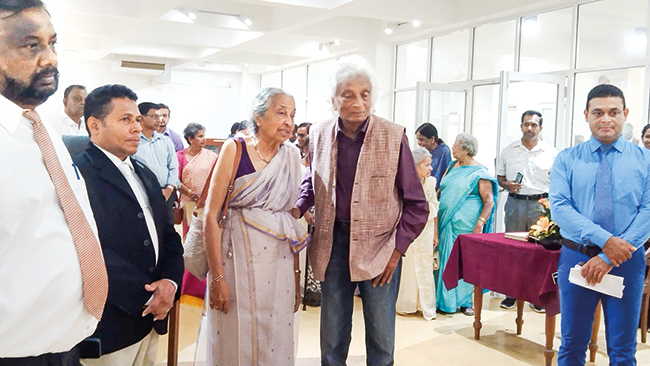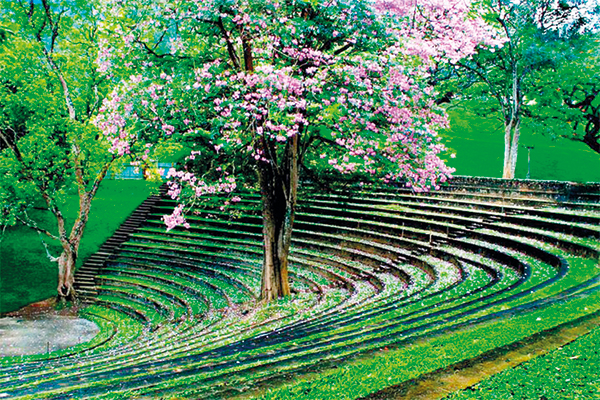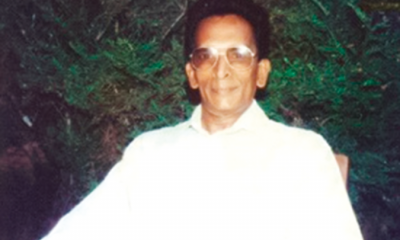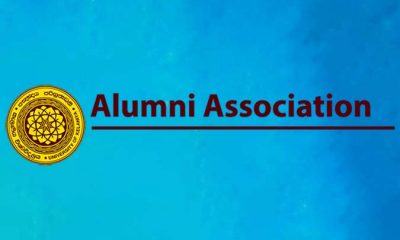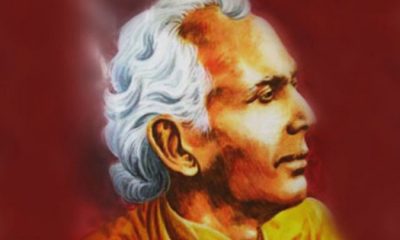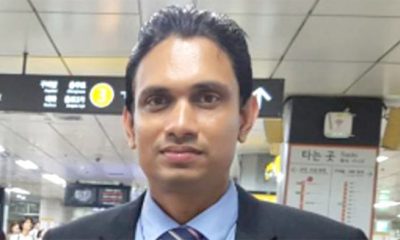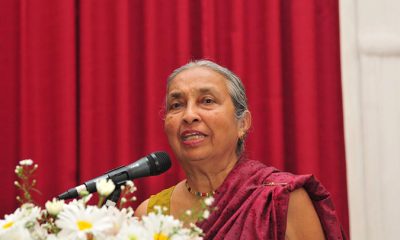Features
New Peradeniya pays tribute to old Peradeniya
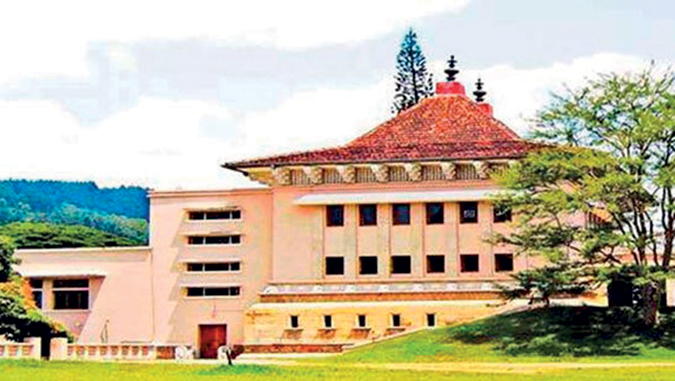
by Liyanage Amarakeerthi
Text of Speech made at at a function held on August 9, 2023 to celebrate the handing over to Professor Gananath Obyesekere’s personal library, the Obeyesekere Collection, to the library of University of Peradeniya.
When I was invited to speak on Professor Gananath Obeyesekere’s work, I said, ‘even though I am more than happy to speak and I am quite familiar with his work,’ I asked, ‘wouldn’t it be better if someone younger, such as Dhammika Herath speaks representing the department of Sociology.’ Here we are, representing the New Peradeniya in appreciating, paying tribute to the old Peradeniya.
My background is literature, and my training is in comparative literature, literary theory, postcolonial studies, Cultural Studies, and so on being the components of that training. In my speech, I will highlight what Professor Gananath Obeyesekere’s work has been to me as a scholar in above subjects teaching in Sri Lanka.
Prof. Gananath Obeyesekere
Let me begin with a short anecdote. In 1993, I was a third-year student at the university of Colombo. On one July day, the inter faculty drama competition was taking place. For the competition, I had written and directed a play. When my play was about to be staged, I peeked through the curtains to take a last look at the panel of judges to make sure they were ready to see the greatest short play in the world. The chairperson of the panel was an elegantly dressed lady, a beautiful madam, who spoke mostly in English.
After many hours, the competition was over but not the intense discussion of the panel. After a while, however, it also ended; my play won all major awards the best play, best script, best actor and so on. Soon after the awards were given away, professor Sarath Wijesooriya, then a lecturer, came to me and said, ‘Anna Ranjini Madam enna kiwwa.’ I went into that special room hoping very much that she would not speak to me in English. Ranjini Madam was that elegant lady, the chairperson of the panel of judges. She talked to me in Sinhala and appreciated the play, and asked me to meet her at Lauries Rd, Bambalapitya.
There we met not only in that summer, but nearly every summer after that, when Obeyesekeres were on vacation. In one of those conversations, I heard ‘Fulbright fellowship’ for the first time. In 1997 I won it; after winning the scholarship, I had to send out applications to universities. In that summer too, Obeyesekeres were in Sri Lanka. Professor Gananath Obeyesekere mentioned ‘the University of Wisconsin.’ In those were pre-internet days, and such little pieces of information mattered a lot. Now, it is 2023, and during the last 30 years, Professor Ranjini Obeyesekere has been my mentor, friend, and an inspiration for working tirelessly in my field. Though history is not always the best judge, let’s hope madam, that your mentee will be judged fairly.
Professor Obeyesekere’s work has been inspirational for me in many ways. Primarily, he has been one of the role models for me and some others in Sri Lankan academia, especially in the faculties of arts, where such role models are extremely rare. He has been an inspiration in speaking truth to power, in keeping a critical distance from all centers of power, and in feeling at home in the loneliness that often comes to you when you keep that distance.
Let me explain briefly, how I have worked some Obeyesekere thoughts into the curricular that I teach at the department of Sinhala here at Peradeniya. Last semester I taught a part of a course, recently introduced to our curriculum, and it deals with the European/colonial representations of Sri Lanka. Edward Said is, of course, an essential thinker there. Our own Obeyesekere is equally important, if not even more relevant. None of my students read scholarly books in English, but when I used Professor Obeyesekere’s Cannibal Talk, and The Apotheosis of Captain Cook translating some sections and explaining some more, my students could see a great thinker at work.
They are intelligent enough to see the main point. Cannibalism has been a conceptual tool of colonialism, the European colonizers representing certain groups of human beings as cannibals. Even more than Sati in India, cannibalistic practices, which were extremely rare, were over emphasized by the colonizers when representing certain groups of people. We have learned from Said’s Orientalism that representation of other people, Asian, African, American, and so on, in colonial discourses is mediated by power, and that power to represent overlaps with power to govern, power to punish, and power to murder.
In there, ‘knowledge’, the knowledge of ‘other’ constructed with the aim of subjugating the other, is a form of power. Foucault may have shown that knowledge is power. Obeyesekere’s work, especially the works mentioned above, shows a much more complex picture of that ‘knowledge/power’ axis. Once a discourse is constructed around a subject and a knowledge is produced within that discourse, many people contribute to sustaining it and giving it a life of its own, as ‘The Doomed King’ amply demonstrates.
Professor Obeyesekere has taught us, how to challenge the received knowledge in a field of study. In Medusa’s Hair, he challenges Edmand Leach, an intellectual giant of the field of anthropology, and one of his teachers. Such debates are now almost nonexistent in our faculty. Some of the debates created by Obeyesekere are of a global scale. His famous book, Apotheosis of Captain Cook, generated a lasting debate with the famous anthropologist Martin Sahlins. Two great anthropologists of our times responded to each other by writing book-length responses.
That debate generated some other debates; other famous anthropologists such as Clifford Geerts, Stanley Thambiah, and so on dedicating special conference panels to the Obeyesekere-Sahlins debate. As I understood it, the thrust of Obeyesekere’s argument was that Hawaiian natives were not epistemologically naïve to accept colonizing Captain Cook as a powerful deity of a new order which was too powerful to resist. Sahlins did have extremely interesting points about what happened when the Old-world colonizers met the New World, the American continent. But my postcolonial Sri Lankan mind tend to agree with Obeyesekere.
Professor Obeyesekere is the most important theoretically oriented scholar in recent times. His psychoanalytic approaches and extremely agile and fluid readings of classical historical narratives and historical characters have rendered them much richer than they had been represented in some colonial, nationalist, or postcolonial readings.
His book, The Work of Culture, one of my favorite Obeyesekere masterpieces, is an extraordinary work beautifully demonstrating a great mind of our times at work. One of the greatest prose writers to be produced by Peradeniya and its department of English, Obeyesekere uses the paradigm of Oedipus to reexamine historical Buddhist characters such as Asoka, Dutugemunu, Kashyapa, and so on.
Given as a series of lectures in 1982, under the general title of “Psychoanalytic Anthropology and some problems of Interpretation,” the book, The Work of Culture, is a rich summary of the author’s previous work, and a demonstration of how a great thinker can work with already familiar materials and yet come up with new insights with surprise, delight, and wisdom. The book, as the case with Obeyesekere scholarship, is an exhibition of putting English language at work to make rich scholarly arguments in beautifully crafted prose, that is not threateningly difficult but yet deep and complex in thought.
In this book, Obeyesekere revisits his famous argument on the Dutugamunu’s conscience, and shows us once more that Gamani was a complex character with a complex personal history. Estranged from his father, under the shadow of a strong mother, married to a woman of whom the dominant historical narratives prefer to be silent, having a brother with whom his relationship is a ‘typical case of sibling rivalry,’ and then, and finally as a king who is forced by contemporary politics to kill a virtuous king. For Obeyesekere, the troubled conscience of Gamini as a son, brother, husband, father, and a ruler, can be used as a metaphor of reminding us of the need for a society conducive to have much more peaceful conscience not only for rulers for all of us.
Not surprisingly, this rich reading of historical events and characters was misunderstood, Obeyesekere was turned into a national villain in extremely one-dimensional nationalist/racist by the Sinhala press. Peradeniya university that produced Obeyesekere was to produce scholars who argue that Dutugemunu, by extension Sinhala people, has no sense of guilt in their conscience! No wonder that Sri Lanka has descended into the political, ethical, cultural abyss that it is in right now.
Obeyesekere has been a leading critic of European enlightenment rationalism. In ‘Medusa’s Hair’ he uses the theories of personal symbols and psychoanalysis to understand mythic-religious experience at the level of religious magic. His critique of Western rationalism finds its best expression in the ‘Awakened Ones: Phenomenology of Visionary Experience,’ a stunning book close to my heart since I have been a writer and scholar looking for all possible alternatives to naturalist realism.
The critique of Western rationalism has been something fashionable in our country, with extreme cultural relativists getting themselves lost in the domain of Natha deviyo. Obeyesekere’s critique of rationalism is the kind that would not end up producing or promoting the racists such as Channa Jayasumana.
Professor Obeyesekere critically defends the enlightenment tradition, supplementing Cartesian rational cogito with all kinds of other forms of insight, intuition, or vision articulated within the European enlightenment tradition itself and beyond. Descartes famously said, ‘I think therefore I am.’ There, ‘to think’ means rational thought.
But meditative insight, vision, the sudden vision or the epiphany of poets, or what Freud calls, ‘lucid dreaming’ have been ‘forms of knowledge’ in nearly all traditions. Obeyesekere’s study is the only book-length treatment of these phenomena in recent years.
That brings me to another point I want to make: ‘comparative nature of Obeyesekere scholarship.’ Some of his books are large, intimidatingly so. But written in elegant and unpretentious prose, they are invitingly readable, and once you get in, you would not come out of them without a feeling of remarkable expansion in your consciousness and awareness. Take for example, ‘Imagining Karma: Ethical Transformation in Amerindian, Buddhist, and Greek Rebirth.’ Before I encountered this book, I did not know that the idea of Karma as a form of ethical rationality and as a form of causality explaining human life beyond our mundane world or this life, can be used as a theoretical category for intercultural understanding.
Karma, not necessarily in the Buddhist sense of the word, has existed in many other cultures. Deep, reflective thinking, and philosophical formations on life after death have not been unique to a single culture. This book, as several other Obeyesekere books and essays, demonstrates that serious big questions about life such as the meaning of life have been raised everywhere.
Sometimes, human beings have learned from each other the art of asking those questions. Sometimes, similar questions have been asked independent of each other. In many ways and on many times, Obeyesekere scholarship has shown us our shared humanity. I have tried to pass on that message to my students hoping to get them out of parochial nationalisms they have been brought up in for decades in our country.
Speaking of parochialism, let me touch on Professor Obeyesekere’s recent book, a lovely little book, ‘The Many Faces of the Kandyan Kingdom’, that invites us to reconsider the cosmopolitan nature of Kandyan kingdom through the 16th and 18th centuries. Several Kandyan kings such as Rajasingha II, enjoyed having foreigners in Kandy. While those foreigners were useful as servants, interpreters, craftsmen, soldiers, mechanics, gunners and so on, it was not for instrumental reasons, the king liked having international visitors around.
The king enjoyed seeing the many faces of humanity in his domain. With such cosmopolitan outlooks, the king and the elites were not threatened by the presence of cultural difference. There is no wonder that the subtitle of the book is ‘lessons for our time.’ In ‘our time, even when we beg for more tourism dollars and foreign support, those very nationalist forces that brought the country down, can be seen promoting extreme chauvinism and xenophobia.
Social theory has been something fashionable in Sri Lanka for decades. But many theory persons are insanely pretentious and esoteric. Some theoreticians are just name-droppers whose pretensions do no more than dulling the epistemological cutting edges of those theories. Obeyesekere, in contrast, demonstrates how theories can be applied in analyzing texts and rituals in a way the theories themselves are better honed. ‘Medusa’s Hair’ is a beautiful example of that fact. Even when one does not agree with Obeyesekere’s theories, one can still admire the way theories are used.
In Medusa’s Hair, the main theoretical approach was Jungian and Freudian psychoanalysis. The book deals with folk priests and priestess who perform magical religious acts. Abdin is one of them. He uses religious trance to bury himself in a grave for hours and come back unharmed. Obeyesekere spends years observing him. At one point, he asks Abdin if he ever had ejaculation while in the coffin, and Abdin answers, ‘Yes. Every time.’ Perhaps Freud is right in arguing that many of such religious-mythical heroics can be sublimations of unfulfilled sexual desires. We really do not know if Abdin lied. Obeyesekere was able to ask that question because he had a good grounding in psychoanalytic theory. All Obeyesekere books are full of such examples.
As a scholar in literature, let me wind up highlighting another hallmark of Obeyesekere scholarship, which is dear to my heart. Professor Obeyesekere has a rich literary mind. In fact, it runs in the family, Obeyesekere family. Gananath and Ranjini are the most celebrated literary couple in the country. In addition to Ranjini translating Sinhala literature into English, Gananath constantly uses literary works in his research. In using literature, especially narratives, for research Obeyesekere does not reduce them to mere facts but attends to the richness of narrative literature by paying attention to layered-meanings, connotations, sub-texts, the meanings of narrative structures and so on.
That requires a deeper understanding of how literature works. The younger generation of sociologists of this country must pay attention to the way Obeyesekere reads, interprets, and engages with literary works. It was clear from the early work of Obeyesekere that the taste for good literature was a hallmark of his work, and his early essays in Sinhala and English attest to the fact that he could have become the literary giant of this country in the generation after Sarachchandra and Ludowyke, had he stayed in the field of English or Sinhala. Nearly all his work contains constant reference to literature both European and South Asian, especially Sinhala.
I said earlier that Professor Gananath Obeyesekere has been one of my role models. Let me now qualify that statement a bit. We have a group of younger academics here at the faculty of Arts, who constantly speak of the ways of waking up from the nightmare of mediocrity we are trapped in. When mediocrity is the majority, the nightmare is, for them, their sweetest dream ever. A group of us regularly meet, informally, to discuss this issue.
The name Obeyesekere, both Gananath and Ranjini, constantly appear in those discussions. Both of them are role models for all of us. But here comes the qualification: I wish Professor Gananth wrote more in Sinhala. If he did so through 1980s through 1990s, the parochialisms that led to the nightmare mentioned above would not have engulfed all of us. I also wish that the group of excellent scholars made of Ganananth, Michael Roberts, Stanley Thambiah, Siri Gunasinghe, Sugathapala de Silva, Kithsiri Malalgoda, C.R. de Silva, H. L. Seneviratne, and so on did not leave the country. For example, the vacuum created by Siri Gunasinghe by leaving the country and not writing enough in Sinhala, was filled by extremely one-dimensionally nationalist ideologues.
Yet again, if professor Obeyesekere did not leave country, when he did, and if he did not write in English until he became a leading anthropologist in the world, he would not have been able to build up the rich personal library donated to us today, and, perhaps, he would not have been able to write the great books, I mentioned above. I invite younger scholars in our faculty, and the brightest of our students, to learn your English well and come of your parochial worlds, here we have now the biography of Obeyesekere and, his library, a road map of his intellectual journey, and make them your own.
I own twelve of his books, I can be the only one to own a copy of the Pattini book in my generation, because it is so rare now. But I don’t have time to touch on all of them here. Let’s organize ourselves into a group, and collectively read Obeyesekere books, and the Obeyesekere collection.
Features
Digital transformation in the Global South
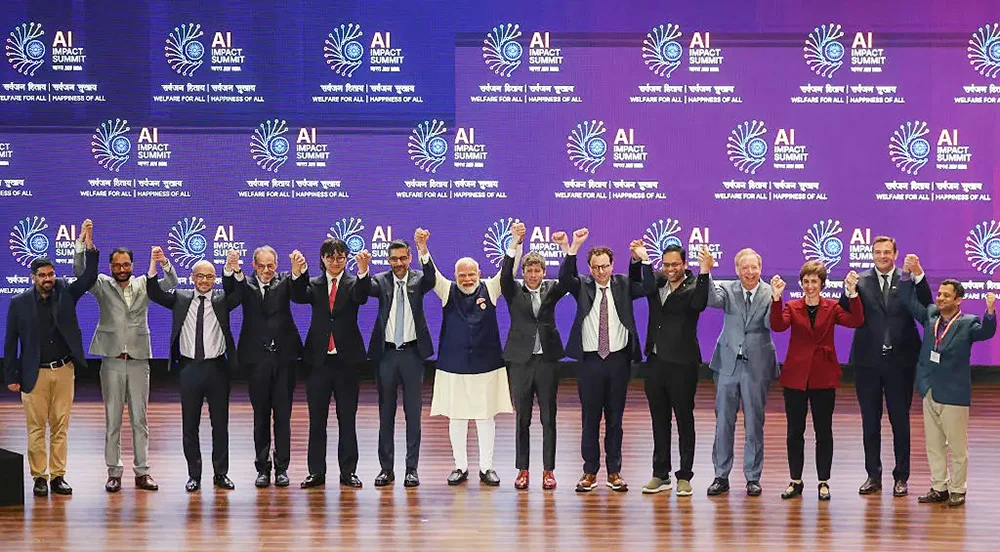
Understanding Sri Lanka through the India AI Impact Summit 2026
Artificial Intelligence (AI) has rapidly moved from being a specialised technological field into a major social force that shapes economies, cultures, governance, and everyday human life. The India AI Impact Summit 2026, held in New Delhi, symbolised a significant moment for the Global South, especially South Asia, because it demonstrated that artificial intelligence is no longer limited to advanced Western economies but can also become a development tool for emerging societies. The summit gathered governments, researchers, technology companies, and international organisations to discuss how AI can support social welfare, public services, and economic growth. Its central message was that artificial intelligence should be human centred and socially useful. Instead of focusing only on powerful computing systems, the summit emphasised affordable technologies, open collaboration, and ethical responsibility so that ordinary citizens can benefit from digital transformation. For South Asia, where large populations live in rural areas and resources are unevenly distributed, this idea is particularly important.
People friendly AI
One of the most important concepts promoted at the summit was the idea of “people friendly AI.” This means that artificial intelligence should be accessible, understandable, and helpful in daily activities. In South Asia, language diversity and economic inequality often prevent people from using advanced technology. Therefore, systems designed for local languages, and smartphones, play a crucial role. When a farmer can speak to a digital assistant in Sinhala, Tamil, or Hindi and receive advice about weather patterns or crop diseases, technology becomes practical rather than distant. Similarly, voice based interfaces allow elderly people and individuals with limited literacy to use digital services. Affordable mobile based AI tools reduce the digital divide between urban and rural populations. As a result, artificial intelligence stops being an elite instrument and becomes a social assistant that supports ordinary life.
Transformation in education sector
The influence of this transformation is visible in education. AI based learning platforms can analyse student performance and provide personalised lessons. Instead of all students following the same pace, weaker learners receive additional practice while advanced learners explore deeper material. Teachers are able to focus on mentoring and explanation rather than repetitive instruction. In many South Asian societies, including Sri Lanka, education has long depended on memorisation and private tuition classes. AI tutoring systems could reduce educational inequality by giving rural students access to learning resources, similar to those available in cities. A student who struggles with mathematics, for example, can practice step by step exercises automatically generated according to individual mistakes. This reduces pressure, improves confidence, and gradually changes the educational culture from rote learning toward understanding and problem solving.
Healthcare is another area where AI is becoming people friendly. Many rural communities face shortages of doctors and medical facilities. AI-assisted diagnostic tools can analyse symptoms, or medical images, and provide early warnings about diseases. Patients can receive preliminary advice through mobile applications, which helps them decide whether hospital visits are necessary. This reduces overcrowding in hospitals and saves travel costs. Public health authorities can also analyse large datasets to monitor disease outbreaks and allocate resources efficiently. In this way, artificial intelligence supports not only individual patients but also the entire health system.
Agriculture, which remains a primary livelihood for millions in South Asia, is also undergoing transformation. Farmers traditionally rely on seasonal experience, but climate change has made weather patterns unpredictable. AI systems that analyse rainfall data, soil conditions, and satellite images can predict crop performance and recommend irrigation schedules. Early detection of plant diseases prevents large-scale crop losses. For a small farmer, accurate information can mean the difference between profit and debt. Thus, AI directly influences economic stability at the household level.
Employment and communication reshaped
Artificial intelligence is also reshaping employment and communication. Routine clerical and repetitive tasks are increasingly automated, while demand grows for digital skills, such as data management, programming, and online services. Many young people in South Asia are beginning to participate in remote work, freelancing, and digital entrepreneurship. AI translation tools allow communication across languages, enabling businesses to reach international customers. Knowledge becomes more accessible because information can be summarised, translated, and explained instantly. This leads to a broader sociological shift: authority moves from tradition and hierarchy toward information and analytical reasoning. Individuals rely more on data when making decisions about education, finance, and career planning.
Impact on Sri Lanka
The impact on Sri Lanka is especially significant because the country shares many social and economic conditions with India and often adopts regional technological innovations. Sri Lanka has already begun integrating artificial intelligence into education, agriculture, and public administration. In schools and universities, AI learning tools may reduce the heavy dependence on private tuition and help students in rural districts receive equal academic support. In agriculture, predictive analytics can help farmers manage climate variability, improving productivity and food security. In public administration, digital systems can speed up document processing, licensing, and public service delivery. Smart transportation systems may reduce congestion in urban areas, saving time and fuel.
Economic opportunities are also expanding. Sri Lanka’s service based economy and IT outsourcing sector can benefit from increased global demand for digital skills. AI-assisted software development, data annotation, and online service platforms can create new employment pathways, especially for educated youth. Small and medium entrepreneurs can use AI tools to design products, manage finances, and market services internationally at low cost. In tourism, personalised digital assistants and recommendation systems can improve visitor experiences and help small businesses connect with travellers directly.
Digital inequality
However, the integration of artificial intelligence also raises serious concerns. Digital inequality may widen if only educated urban populations gain access to technological skills. Some routine jobs may disappear, requiring workers to retrain. There are also risks of misinformation, surveillance, and misuse of personal data. Ethical regulation and transparency are, therefore, essential. Governments must develop policies that protect privacy, ensure accountability, and encourage responsible innovation. Public awareness and digital literacy programmes are necessary so that citizens understand both the benefits and limitations of AI systems.
Beyond economics and services, AI is gradually influencing social relationships and cultural patterns. South Asian societies have traditionally relied on hierarchy and personal authority, but data-driven decision making changes this structure. Agricultural planning may depend on predictive models rather than ancestral practice, and educational evaluation may rely on learning analytics instead of examination rankings alone. This does not eliminate human judgment, but it alters its basis. Societies increasingly value analytical thinking, creativity, and adaptability. Educational systems must, therefore, move beyond memorisation toward critical thinking and interdisciplinary learning.
AI contribution to national development
In Sri Lanka, these changes may contribute to national development if implemented carefully. AI-supported financial monitoring can improve transparency and reduce corruption. Smart infrastructure systems can help manage transportation and urban planning. Communication technologies can support interaction among Sinhala, Tamil, and English speakers, promoting social inclusion in a multilingual society. Assistive technologies can improve accessibility for persons with disabilities, enabling broader participation in education and employment. These developments show that artificial intelligence is not merely a technological innovation but a social instrument capable of strengthening equality when guided by ethical policy.
Symbolic shift
Ultimately, the India AI Impact Summit 2026 represents a symbolic shift in the global technological landscape. It indicates that developing nations are beginning to shape the future of artificial intelligence according to their own social needs rather than passively importing technology. For South Asia and Sri Lanka, the challenge is not whether AI will arrive but how it will be used. If education systems prepare citizens, if governments establish responsible regulations, and if access remains inclusive, AI can become a partner in development rather than a source of inequality. The future will likely involve close collaboration between humans and intelligent systems, where machines assist decision making while human values guide outcomes. In this sense, artificial intelligence does not replace human society, but transforms it, offering Sri Lanka an opportunity to build a more knowledge based, efficient, and equitable social order in the decades ahead.
by Milinda Mayadunna
Features
Governance cannot be a postscript to economics
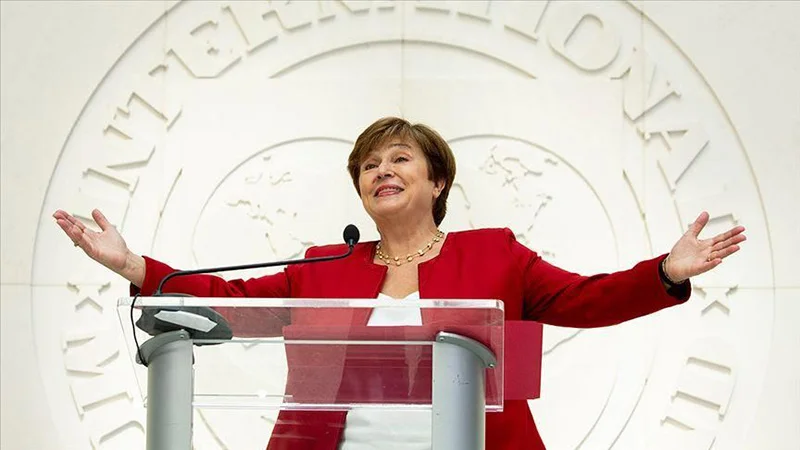
The visit by IMF Managing Director Kristalina Georgieva to Sri Lanka was widely described as a success for the government. She was fulsome in her praise of the country and its developmental potential. The grounds for this success and collaborative spirit go back to the inception of the agreement signed in March 2023 in the aftermath of Sri Lanka’s declaration of international bankruptcy. The IMF came in to fulfil its role as lender of last resort. The government of the day bit the bullet. It imposed unpopular policies on the people, most notably significant tax increases. At a moment when the country had run out of foreign exchange, defaulted on its debt, and faced shortages of fuel, medicine and food, the IMF programme restored a measure of confidence both within the country and internationally.
Since 1965 Sri Lanka has entered into agreements with the IMF on 16 occasions none of which were taken to their full term. The present agreement is the 17th agreement . IMF agreements have traditionally been focused on economic restructuring. Invariably the terms of agreement have been harsh on the people, with priority being given to ensure the debtor country pays its loans back to the IMF. Fiscal consolidation, tax increases, subsidy reductions and structural reforms have been the recurring features. The social and political costs have often been high. Governments have lost popularity and sometimes fallen before programmes were completed. The IMF has learned from experience across the world that macroeconomic reform without social protection can generate backlash, instability and policy reversals.
The experience of countries such as Greece, Ireland and Portugal in dealing with the IMF during the eurozone crisis demonstrated the political and social costs of austerity, even though those economies later stabilised and returned to growth. The evolution of IMF policies has ensured that there are two special features in the present agreement. The first is that the IMF has included a safety net of social welfare spending to mitigate the impact of the austerity measures on the poorest sections of the population. No country can hope to grow at 7 or 8 percent per annum when a third of its people are struggling to survive. Poverty alleviation measures in the Aswesuma programme, developed with the agreement of the IMF, are key to mitigating the worst impacts of the rising cost of living and limited opportunities for employment.
Governance Included
The second important feature of the IMF agreement is the inclusion of governance criteria to be implemented alongside the economic reforms. It goes to the heart of why Sri Lanka has had to return to the IMF repeatedly. Economic mismanagement did not take place in a vacuum. It was enabled by weak institutions, politicised decision making, non-transparent procurement, and the erosion of checks and balances. In its economic reform process, the IMF has included an assessment of governance related issues to accompany the economic restructuring process. At the top of this list is tackling the problem of corruption by means of publicising contracts, ensuring open solicitation of tenders, and strengthening financial accountability mechanisms.
The IMF also encouraged a civil society diagnostic study and engaged with civil society organisations regularly. The civil society analysis of governance issues which was promoted by Verite Research and facilitated by Transparency International was wider in scope than those identified in the IMF’s own diagnostic. It pointed to systemic weaknesses that go beyond narrow fiscal concerns. The civil society diagnostic study included issues of social justice such as the inequitable impact of targeting EPF and ETF funds of workers for restructuring and the need to repeal abuse prone laws such as the Prevention of Terrorism Act and the Online Safety Act. When workers see their retirement savings restructured without adequate consultation, confidence in policy making erodes. When laws are perceived to be instruments of arbitrary power, social cohesion weakens.
During a meeting between the IMF Managing Director Georgeiva and civil society members last week, there was discussion on the implementation of those governance measures in which she spoke in a manner that was not alien to the civil society representatives. Significantly, the civil society diagnostic report also referred to the ethnic conflict and the breakdown of interethnic relations that led to three decades of deadly war, causing severe economic losses to the country. This was also discussed at the meeting. Governance is not only about accounting standards and procurement rules. It is about social justice, equality before the law, and political representation. On this issue the government has more to do. Ethnic and religious minorities find themselves inadequately represented in high level government committees. The provincial council system that ensured ethnic and minority representation at the provincial level continues to be in abeyance.
Beyond IMF
The significance of addressing governance issues is not only relevant to the IMF agreement. It is also important in accessing tariff concessions from the European Union. The GSP Plus tariff concession given by the EU enables Sri Lankan exports to be sold at lower prices and win markets in Europe. For an export dependent economy, this is critical. Loss of such concessions would directly affect employment in key sectors such as apparel. The government needs to address longstanding EU concerns about the protection of human rights and labour rights in the country. The EU has, for several years, linked the continuation of GSP Plus to compliance with international conventions. This includes the condition that the Prevention of Terrorism Act (PTA) be brought into line with international standards. The government’s alternative in the form of the draft Protection of the State from Terrorism Act (PTSA) is less abusive on paper but is wider in scope and retains the core features of the PTA.
Governance and social justice factors cannot be ignored or downplayed in the pursuit of economic development. If Sri Lanka is to break out of its cycle of crisis and bailout, it must internalise the fact that good governance which promotes social justice and more fairly distributes the costs and fruits of development is the foundation on which durable economic growth is built. Without it, stabilisation will remain fragile, poverty will remain high, and the promise of 7 to 8 percent growth will remain elusive. The implementation of governance reforms will also have a positive effect through the creative mechanism of governance linked bonds, an innovation of the present IMF agreement.
The Sri Lankan think tank Verité Research played an important role in the development of governance linked bonds. They reduce the rate of interest payable by the government on outstanding debt on the basis that better governance leads to a reduction in risk for those who have lent their money to Sri Lanka. This is a direct financial reward for governance reform. The present IMF programme offers an opportunity not only to stabilise the economy but to strengthen the institutions that underpin it. That opportunity needs to be taken. Without it, the country cannot attract investment, expand exports and move towards shared prosperity and to a 7-8 percent growth rate that can lift the country out of its debt trap.
by Jehan Perera
Features
MISTER Band … in the spotlight

 It’s a good sign, indeed, for the local scene, to see artistes, who have not been very much in the limelight, now making their presence felt, in a big way, and I’m glad to give them the publicity they deserve.
It’s a good sign, indeed, for the local scene, to see artistes, who have not been very much in the limelight, now making their presence felt, in a big way, and I’m glad to give them the publicity they deserve.
On 10th February we had Yellow Beatz in the spotlight and this week it’s MISTER Band.
This outfit is certainly not new to our scene; they have been around since 2012, under the leadership of Sithum Waidyarathne.
The seven energetic members who make up MISTER Band are:
Sithum Waidyarathne (leader/founder/saxophonist/guitarist and vocalist), Rangana Seram (bass guitarist), Vihanga Liyanage (vocalist), Ridmi Dissanayake (female vocalist), Nuwan Cristo (keyboardist/vocalist), Kasun Thennakoon (lead guitarist), and Nuwan Madushanka (drummer).
According to Sithum, their vision is to provide high quality entertainmen to those who engage their services.
“Thanks to our engaging performances and growing popularity, MISTER Band continues to be in high demand … at weddings, corporate events and dinner dances,” said Sithum.
They predominantly cover English and Sinhala music, as well as the most popular genres.
And the reviews that come their way, after a performance, are excellent, they say, and this is one of the bouquets they received:
It was a pleasure to have you at our wedding. Being avid music fans we wanted the best music, not just a big named band, and you guys acceded that expectations. Big thanks to Sithum for being very supportive, attentive and generous.
- Sithum Waidyarathne: Band leader and founder
- Ridmi Dissanayake: MISTER Band’s female vocalist
The best thing is the post feedback from all the guests. Normally we get mixed reviews but the whole crowd was impressed by you.
MISTER Band was one of our best choices for our wedding.
What is interesting is that for the past four consecutive years, this outfit has performed overseas, during New Year’s Eve, thereby taking their music to the international stage, as well.
The band has also produced a collection of original songs, with around six original tracks composed by the band leader, Sithum Waidyarathne, including ‘Suraganak Dutuwa,’ ‘Landuni,’ ‘Dili Dili Payana,’ ‘Hada Wedana,’ and ‘Nil Kandu Athare.’
Two more songs are set to be released this month: ‘Hitha Norida’ and ‘Premaye Hanguman.’
In addition to their original music, they have also created a strong online presence by performing and uploading over 50 cover songs and medleys to YouTube.
“We’re now planning to connect with an even wider audience by releasing more cover content very soon,” said Sithum, adding that they are also very active on social media, under the name Mister Band Official – on Facebook, Instagram, YouTube, and TikTok.
-

 Features3 days ago
Features3 days agoWhy does the state threaten Its people with yet another anti-terror law?
-

 Features3 days ago
Features3 days agoReconciliation, Mood of the Nation and the NPP Government
-

 Features3 days ago
Features3 days agoVictor Melder turns 90: Railwayman and bibliophile extraordinary
-

 Features2 days ago
Features2 days agoLOVEABLE BUT LETHAL: When four-legged stars remind us of a silent killer
-

 Features3 days ago
Features3 days agoVictor, the Friend of the Foreign Press
-

 Latest News4 days ago
Latest News4 days agoNew Zealand meet familiar opponents Pakistan at spin-friendly Premadasa
-

 Latest News4 days ago
Latest News4 days agoTariffs ruling is major blow to Trump’s second-term agenda
-

 Latest News4 days ago
Latest News4 days agoECB push back at Pakistan ‘shadow-ban’ reports ahead of Hundred auction

